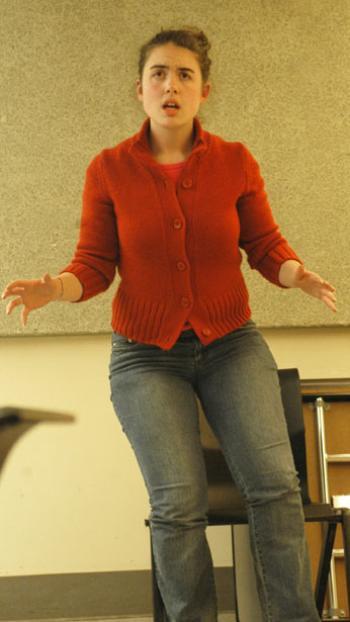
News
Pro-Palestine Encampment Represents First Major Test for Harvard President Alan Garber

News
Israeli PM Benjamin Netanyahu Condemns Antisemitism at U.S. Colleges Amid Encampment at Harvard

News
‘A Joke’: Nikole Hannah-Jones Says Harvard Should Spend More on Legacy of Slavery Initiative

News
Massachusetts ACLU Demands Harvard Reinstate PSC in Letter

News
LIVE UPDATES: Pro-Palestine Protesters Begin Encampment in Harvard Yard
Learn To Love the Monologues
Backstage sisterhood love shows onstage in Ensler college favorite

On this Wednesday night, in a cramped basement room of Lowell Lecture Hall, hot pink shirts line the walls, declaring “It’s not how you love vaginas. It’s that you do.” The cast and crew of the Vagina Monologues (VM) has convened to plan out their upcoming performances.
“So are we doing the whole cunt-woman prop thing or not?” asks one cast member. The roughly twenty members of the Athena Theater Company (ATC) present at the meeting break out in a peal of giggles.
It is the kind of laughter that flows easily and gives observers just one glimpse into the close camaraderie that has inspired these female students in presenting the annual ATC charity production of “The Vagina Monologues.” According to Tulita M. Papke ’06, a VM producer who is in her third year running on the show, it is just this kind of solidarity that keeps longtime VM participants coming back for more.
But the rapport of old friends among the cast and crew is certainly not due to any cookie-cutter personalities on the VM team. On the contrary, Papke says, “We come from a pretty wide range of backgrounds, but at the same time, we are interested in a lot of the same topics.”
Papke adds that the shows participants are united by their comfort with the material, noting that “not everyone is comfortable with this show and the discussion that VM raises. Most who are [participating] have thought about some of the same things.”
VM actress Alison E. Cohen ’07 adds, “The fact is that most of the participants wouldn’t have met if they hadn’t participated in the Vagina Monologues…All are interested in improving the lives of women everywhere and we’re also really interested in being a part of an all-woman cast.”
If they were looking for an all-female cast, the VM cast members sought out the right student group, since, as Papke puts it, the ATC specializes in “a very wide range of shows which feature a lot of women in major roles, deal with women’s issues directly, and, often, have a slightly activist bent.”
Since its popular off-Broadway run in 1997, Eve Ensler’s poignantly tragic and humor-tinged series of monologues on female sexuality has become a mainstay on college campuses, and Harvard is no exception. Cohen claims her time on the Cantabrigian campus forced her to take notice of works like VM. Says Cohen, “Being at Harvard has made me think much more about issues about issues of gender.”
At the Wednesday cast meeting, Cohen gave an impromptu preview of her role in VM as a sixty-something lady who has resisted becoming close to a man after her first orgasm at age 20 and now has reluctantly submitted to an interview on her sexuality. In a convincing if inconsistent Brooklyn drawl, Cohen delivered her monologue with a stage confidence that revealed her expansive experience as a Spoken Word performance poet. Comparing her vagina to a “cellar” (a part of the house that “no one talks about”), Cohen’s character makes no secret of her shame in and objections to speaking about her sexuality, saying “We didn’t talk about this when I was a girl.”
In a performance that’s perhaps less polished but more personally relatable for Harvard’s young women, Ipek Mutlu ’05 acts as a twenty-something who dresses provocatively not to provoke reactions from males but for her own personal satisfaction. In her performance, a scantily clad Mutlu exhorts audiences to remember that a short skirt is neither an “invitation nor a provocation.” According to Mutlu such clothing is a sign of “happiness for a woman and [demonstrates] an appreciation of her own body!” The show’s subject matter is not entirely foreign to Mutlu. Indeed, Mutlu reports that she was drawn to VM particularly because “I identify with a lot of the themes, feelings and concepts explored in the work, especially in my piece.”
Both performances exemplify the aim and methods characteristic of Ensler’s Monologues: both raise awareness of female sexuality by stirring an audience and even making them uncomfortable. Whether presenting an old lady discussing her vagina or a woman uninhibitedly flaunting her sexuality, VM is made with a message.
According to Cohen, her character portrays a palpable generational difference in the consideration of female sexuality. Cohen says her character’s sense of shame demonstrates that “there are still many women who think that pleasure during sexual activity isn’t something women are supposed to enjoy.” Mutlu’s monologue, on the other hand, not so subtly promotes a woman’s freedom to dress regardless of what onlookers may think.
At one point, Cohen’s character chides her unseen interviewer, saying “You happy now? You got an old lady to talk about her ‘down theres’?” But she soon calms herself, realizing, “Actually you’re the first person I’ve told about this…and I kind of feel a little better.” Rest assured, much of the show’s audiences will likely leave the show with a similar sense of edification and relief.
—Reviewer Vinita M. Alexander can be reached at valexand@fas.harvard.edu.
Want to keep up with breaking news? Subscribe to our email newsletter.
